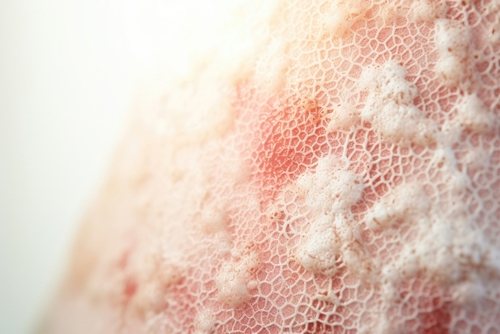Johnson & Johnson’s investigative oral interleukin (IL)-23 blocker, JNJ-2113, maintains skin clearance in moderate-to-severe plaque psoriasis through one year, according to data from the long-term extension FRONTIER 2 study presented at the American Academy of Dermatology 2024 Annual Meeting in San Diego.
In FRONTIER 2, JNJ-2113 maintained high rates of skin clearance through 52 weeks in adults with moderate-to-severe plaque Psoriasis. In the five JNJ-2113 treatment groups, as measured by the Psoriasis Area and Severity Index (PASI), response rates were maintained from Week 16 to Week 52, with the highest PASI 75 response observed in the 100 mg twice daily group (78.6 at 16 weeks and 76.2 percent at 52 weeks).
Similar to the primary endpoint, responses were maintained through Week 52 for all five JNJ-2113 treatment groups for the key secondary endpoints of PASI 90 (59.5 at 16 weeks and 64.3% at 52 weeks), PASI 100 (40.5% at 16 weeks and 40.5% at 52 weeks), Investigator’s Global Assessment (IGA) 0/1 (64.3% at 16 weeks and 73.8% at 52 weeks) and IGA 0 (45.2% at 16 weeks and 42.9% at 52 weeks).
Safety in the FRONTIER 2 long-term extension study (week 16 through Week 52) was found to be consistent with FRONTIER 1. Across JNJ-2113 treatment groups, 58.6% of patients experienced adverse events (AEs), with no evidence of dose-dependent increase in AEs, including gastrointestinal disorders. The most frequently reported AEs were nasopharyngitis, upper respiratory tract infection, and COVID-19. Serious AEs were uncommon, occurring in 4% of the combined JNJ-2113 patients through week 52, and all serious AEs were considered unrelated to study treatment.
“Data from the FRONTIER 2 study showed that the skin clearance as seen by PASI 75 and higher-bar PASI 90 and 100 responses at 16 weeks was maintained at 52 weeks with no new safety signals across all JNJ-2113 treatment groups,” says Laura Ferris, MD, PhD, Professor of Dermatology, University of Pittsburgh, in a news release. “These findings suggest the potential for JNJ-2113 to continue delivering clinically meaningful results, and addresses the high unmet need for a novel, durable, and convenient oral therapeutic option for people living with moderate-to-severe plaque psoriasis.”
In FRONTIER 2, patients who originally received JNJ-2113 in FRONTIER 1 during the first 16 weeks continued with the same dosing regimen they received in the earlier part of the trial. Patients who were originally in the placebo group received JNJ-2113 100 mg once daily in FRONTIER 2. Data from the Phase 2b FRONTIER 1 study evaluating JNJ-2113 in adults with moderate-to-severe PsO were recently published in The New England Journal of Medicine.
The pivotal Phase 3 ICONIC clinical development program is currently underway to evaluate the safety and efficacy of JNJ-2113 in adults with moderate-to-severe plaque PsO, including the ICONIC-LEAD and ICONIC-TOTAL studies – pursuant to the license and collaboration agreement between Protagonist Therapeutics, Inc. and Janssen Biotech, Inc. Other Phase 3 studies in the development program have been initiated, including ICONIC-ADVANCE 1 and ICONIC-ADVANCE 2, which will evaluate the safety and efficacy of JNJ-2113 compared with both placebo and deucravacitinib (Sotyktu, BMS).
J&J has initiated the Phase 2b ANTHEM-UC study to evaluate the safety and effectiveness of JNJ-2113 compared with placebo in participants with moderately to severely active ulcerative colitis.


